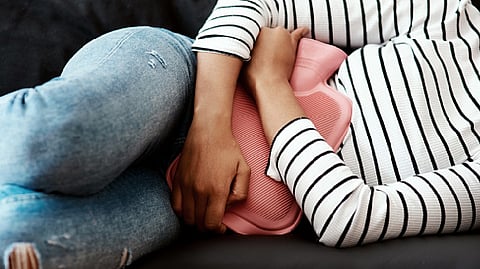

NEW DELHI: I remember being in the classroom teaching, and I was in so much pain that I was in tears. And I just didn’t know what to do. And obviously, I had to leave.” This is how Judy
Birch describes what it was like when she had severe menstrual symptoms.Birch, who now runs the UK-based Pelvic Pain Support Network, is among billions of women who suffer
from severe menstruation symptoms. Called dysmenorrhea, this could include heavy bleeding, severe cramping and fatigue; or even nausea, vomiting and diarrhoea. According to one comprehensive review of studies, up to 91% of women in reproductive age suffer from dysmenorrhea, including severe pain in among up to 29%. Dysmenorrhea is severe enough to interfere with the daily activities of up to 20% of women, says the American Academy of Family Physicians. “I just struggled through,”Birch says, “not able to concentrate, not able to focus … and I just wasn’t functioning properly at all.” In some countries around the world, women may draw upon legally allocated time off during their periods. Such “menstrual leave” policies are controversial they’re accused of fuelling stigma and discrimination, end up a subject of intense debate and have difficulty gaining traction. Yet Spain could be poised to become the first such country in Europe to offer this kind of leave.A leaked draft law, slated to head to Spain’s ministerial council on Tuesday, would allocate up to three day severy month for menstrual leave. Although not all details are clear, women would need to be experiencing severe menstrual symptoms and likely be required to present a medical certificate to claim the leave. Only a handful of countries — Japan, South Korea, Taiwan, Indonesia and Zambia — currently have national policy frameworks
that grant paid menstrual leave.In European countries with generous leave policies, it’s not common to cite menstruation as the reason for taking time off. In the Netherlands, a 2019 survey of more than 30,000 Dutch women found that although 14% had taken time off work during their period, only 20% provided the true reason.
An extensive academic paper from 2020, published as part of a handbook on menstruation studies, outlined the benefits and drawbacks of menstrual leave in the workplace. Negative implications of such policies include “perpetuating sexist beliefs and attitudes,contributing to menstrual stigma and perpetuating gender stereotypes, negatively impacting the gendered wage gap, and reinforcing the medical isation of menstruation,” the paper says. As mentioned in the paper, menstruators may include non-binary and
transgender people, who should also have access to period leave. This is also one upshot of the 2020 paper, which stated that “some menstruators would benefit from workplace flexibility more generally (for example, more time off, the ability to work from home, customized work schedules).” And some companies are picking upon this point, even building it into their company policies. Zomato, a platform based out of India with a core business of food delivery, has had a menstrual leave policy in place since August 2020. The company’s communications head, Vaidika Parashar, describes the framework as granting 10 period leave days over the course of the year, in addition to other leave.She describes an honour system where employees simply post an emoticon of a calendar with red droplets as their status on a team chat, no questions asked. She also uses this leave. The company has made efforts to promote a company culture where stigma does not get attached to period leave. The policy applies to “all applicable genders,” including transgender people, she explains. “You should not feel uncomfortable about it, it’s a biological function.”
Visit news.dtnext.in to explore our interactive epaper!
Download the DT Next app for more exciting features!
Click here for iOS
Click here for Android